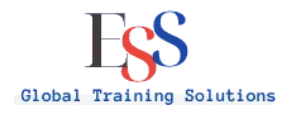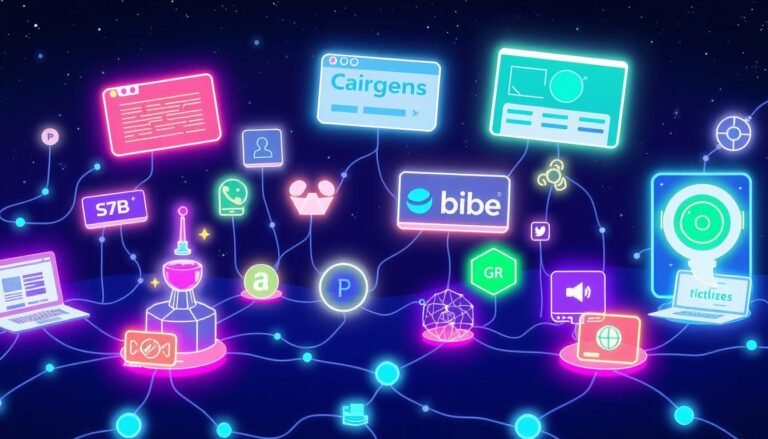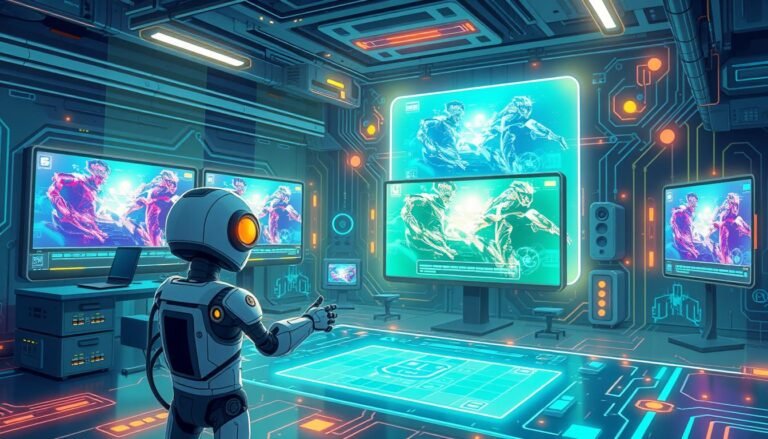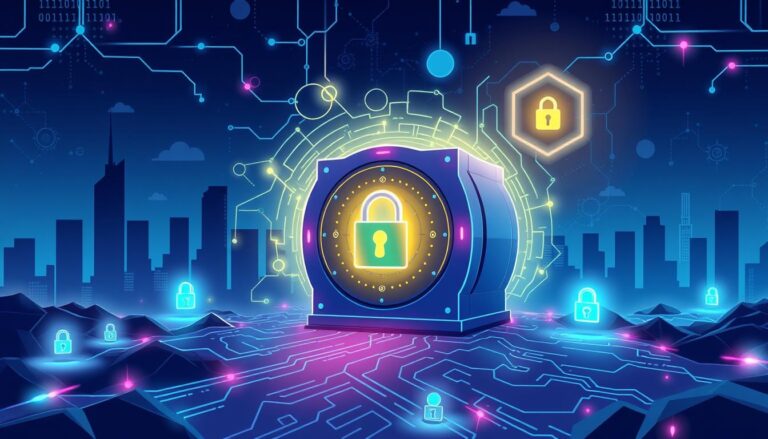AI and Blockchain Integration: Revolutionizing Tech
Are we on the brink of a technological revolution? The mix of AI and blockchain is changing many fields, like finance and healthcare. This new tech combo is not just changing how we work. It’s changing our digital world.
Engineers are leading this change, making AI solutions that break new ground. The market for these solutions is expected to grow to $860 billion by 2025. But what does this mean for you and me?
This tech change is making a big impact. It’s helping cut down on greenhouse gas emissions and bringing banking to those without access. Blockchain makes fast transactions, shaking up the finance world. AI could help cut global emissions by 4% by 2030.
But, there are still challenges. Governments are figuring out how to regulate these new technologies. This creates uncertainty for companies thinking about using them. The cost of starting this change is high. But, the benefits of lower costs, better security, and more efficiency are big. The real question is how fast this change will come.
Key Takeaways
- AI and blockchain integration is driving a technological revolution across industries
- The global hyperautomation market is set to reach $860 billion by 2025
- AI could help reduce global greenhouse gas emissions by 4% by 2030
- Blockchain enables near-instant transactions, reducing settlement times dramatically
- The integration faces regulatory challenges and requires significant initial investment
- This tech fusion promises reduced costs, enhanced security, and improved efficiency
- It has the potential to provide banking services to unbanked populations
The Convergence of AI and Blockchain: A Technological Paradigm Shift
The joining of AI and blockchain is a major leap forward. It’s changing how we see industries and digital interactions. This mix of artificial intelligence and blockchain’s security and openness is creating new, groundbreaking solutions.
Defining AI and Blockchain Synergy
AI and blockchain together make systems smarter and safer. AI adds smart decision-making and data analysis. Blockchain offers a secure, shared platform. This combo boosts both technologies, leading to new uses in many fields.
The Potential Impact on Various Industries
This merge is changing many industries. In finance, AI smart contracts are making complex deals easier. Healthcare gets better with secure, AI-checked patient data on blockchain. Even smart cities are using this tech to manage resources better and improve services.
| Industry | AI-Blockchain Application | Projected Impact |
|---|---|---|
| Finance | Automated smart contracts | $3.5 trillion market by 2028 |
| Healthcare | Secure patient data analysis | Enhanced patient care and privacy |
| Smart Cities | Optimized resource management | Improved quality of life for 9.7 billion by 2050 |
Overcoming Traditional Limitations
This new tech mix solves old problems. AI makes blockchain faster, while blockchain makes AI’s choices clear. They’re working together to fix issues like data safety, system efficiency, and trust in digital worlds. This leads to stronger, more reliable tech solutions.
Decentralized AI: Redefining Intelligent Systems
Decentralized AI is changing the game for intelligent systems, bringing new ideas to many fields. It combines artificial intelligence with blockchain’s distributed technology. This mix creates systems that learn and improve on their own, without needing humans to watch over them all the time.
AI decentralization is changing how businesses work. Companies can now reach more people and keep high quality standards. The blend of blockchain and AI makes systems stronger and more adaptable.
Let’s explore some key benefits of decentralized AI:
- Enhanced adaptability
- Improved learning capabilities
- Increased operational efficiency
- Greater scalability
Decentralized AI is making waves in different areas. For example, in healthcare, AI is helping patients in remote areas get specialist care. These systems use video calls to cut down on travel and costs.
In finance, platforms like ETFSwap (ETFS) use decentralized AI for better trading tools and tokenized ETFs. They offer high leverage trading and secure features, setting new standards in finance.
“Decentralized AI is not just a technological advancement; it’s a paradigm shift that’s redefining how we approach intelligent systems across industries.”
Looking ahead, decentralized AI’s role in making systems more open, safe, and efficient is clear. It’s changing healthcare and finance, leading us towards a smarter, more connected world.
Smart Contracts and AI: Automating Trust
The mix of smart contract AI and automated trust is changing the finance and legal worlds. This new tech makes complex tasks easier, cuts down on mistakes, and helps make better choices.
Enhancing Contract Execution with AI
AI-powered smart contracts are changing how we make deals. These smart systems can look at lots of data, spot trends, and act quicker than people. In finance, they help manage investments and catch scams better than ever before.
Reducing Human Error and Bias
AI in smart contracts helps cut down on human mistakes and bias. By handling contracts on their own, these systems make sure things are fair and consistent. This is really important in the legal field where fairness is key.
Use Cases in Finance and Legal Sectors
AI is making big changes in finance and law:
- Neobanks use AI smart contracts for custom banking services
- Blockchain systems make sharing and keeping data safe in healthcare
- Law firms use AI to speed up contract checks and solve disputes faster
| Sector | AI Smart Contract Application | Benefit |
|---|---|---|
| Finance | Fraud Detection | 98% accuracy in spotting odd transactions |
| Legal | Contract Review | 80% less time needed for reviews |
| Healthcare | EHR Management | 60% better data sharing |
As AI gets better, it will work even closer with smart contracts. This will make trust automation even stronger across many fields, leading to more efficient and clear systems.
Distributed AI Networks: Powering Collective Intelligence
Distributed AI networks are changing how we use collective intelligence. They make it easy for different systems to share data and solve problems together. Thanks to blockchain, data stays safe and trustworthy.
Recent stats show the growth of distributed AI networks. Tenable found over 9 million AI apps on 1 million hosts in 75 days. This shows how important collective intelligence is today.
AI networks are making big changes worldwide. The Dubai AI & Web3 Festival drew 6,800 people from over 100 countries. The Dubai AI Campus is also growing fast, aiming to host 500 companies by 2028.
- Create over 3,000 jobs
- Expand AI Campus to 100,000+ sq. ft
- Attract $300 million in investment
The Design in Saudi Arabia (DISA) program shows the power of distributed AI networks. It helps startups in AI, IoT, and wireless tech. This partnership is boosting innovation and economic growth.
| AI Network Impact | Current | Future Goal |
|---|---|---|
| Companies in Dubai AI Campus | 120+ | 500+ |
| Job Creation | N/A | 3,000+ |
| AI Campus Size (sq. ft) | N/A | 100,000+ |
| Investment Attraction | N/A | $300 million |
Distributed AI networks are getting better. They will help us solve big problems and drive new ideas in many fields.
AI and Blockchain Integration: Ensuring Data Integrity
The mix of AI and blockchain is changing how we handle data integrity. This combo tackles big problems in AI trust and openness. It leads to more dependable and honest AI uses.
Immutable AI Training Data
Blockchain-secured AI solves the problem of data truth. It keeps AI training data safe on a blockchain. This makes sure the data’s source and history are clear, making AI more trustworthy.
Transparent AI Decision-Making Processes
Transparent AI is now a reality. Blockchain makes AI choices clear. Every AI step is recorded on the blockchain, making audits easy. This openness is key in areas like healthcare and finance, where decisions matter a lot.
Building Trust in AI Systems
AI data integrity is key to trusting AI. Blockchain tech makes AI models strong and answerable. This meets growing rules, like GDPR in Europe.
“Implementing AI regulation in the US similar to GDPR would require explicit consent before using data and granting users the ability to opt out of data-driven AI models.”
Looking ahead, blockchain and AI together will change how we use smart systems. With better data integrity and openness, we’re entering a time of reliable AI. This AI can be used in many fields with confidence.
Enhancing AI Transparency through Blockchain Technology
Blockchain is changing how we see AI transparency. It tackles big issues like AI bias and accountability, especially in healthcare and finance. Thanks to blockchain, we can check and understand AI’s decisions, building trust in these systems.
Explainable AI is key here. It lets us see a clear history of AI’s choices and actions. This is vital for making AI more reliable in many fields. For example, in finance, blockchain makes AI trading decisions clear to regulators and investors.
This technology mix is making waves in more than just finance. In the crypto world, we’re seeing big changes:
- Ethereum whales have shifted from accumulating to selling, with Vitalik Buterin transacting over 840,000 ETH for charitable purposes.
- Kaspa (KAS) experienced a 3% increase, pushing its price above $0.15.
- BlockDAG Network has raised $72.5 million from presales, with its coin price increasing by 1680% since inception.
These trends show how crucial transparency is in blockchain systems. As AI and blockchain merge, we’ll see more trustworthy and explainable AI. This will help many sectors and cryptocurrencies.
AI-Powered Security in Blockchain Systems
AI and blockchain security are teaming up to fight cyber threats. This powerful mix is changing how we guard digital assets and catch fraud in the fast world of cryptocurrencies and decentralized networks.
Detecting Anomalies and Fraud
AI is making fraud detection in blockchain systems smarter. These smart algorithms check transaction patterns in real-time. They spot suspicious activities early, keeping blockchain networks safe.
AI gets better at finding fraud by learning from past attacks. This keeps blockchain networks secure.
Predictive Analysis for Threat Prevention
AI’s predictive power is changing blockchain security. It looks at huge amounts of data to predict threats and weaknesses. This lets security teams strengthen defenses before attacks happen.
This proactive approach greatly lowers the chance of successful breaches.
Adaptive Security Measures
Cyber threats are always changing, so defenses must too. AI-powered security adapts to new threats. It changes security rules in real-time, keeping blockchain networks strong against new threats.
| AI Security Feature | Benefit to Blockchain |
|---|---|
| Real-time anomaly detection | Immediate identification of suspicious transactions |
| Predictive analysis | Proactive threat prevention |
| Adaptive security measures | Continuous protection against evolving threats |
As blockchain tech grows, AI security will become more important. The mix of AI and blockchain security promises a future where digital transactions are safer, more open, and fraud-proof.
Scalability Solutions: AI Optimizing Blockchain Performance
Blockchain technology is changing many industries, but it faces a big challenge: scalability. AI is now helping solve this problem, making blockchain networks better. With AI, these networks can handle more data and users, making them ready for big projects.
Timeleap SA is leading this change. Their “Unchained” platform uses AI to boost blockchain performance. They focus on making fast, secure, and big blockchain solutions.
AI and blockchain together open new doors for developers and researchers. For example, DeGPU networks make top-notch GPU power affordable. This helps small teams and solo developers work on AI, machine learning, and blockchain projects faster and cheaper.
| Traditional GPU Rental | DeGPU Network |
|---|---|
| Expensive for small businesses | Cost-effective solution |
| Limited accessibility in some regions | Democratized access globally |
| Scalability issues during high demand | Improved scalability with distributed resources |
| Environmental concerns with data centers | Contributes to green computing practices |
As AI keeps improving blockchain, we’ll see even better network performance. This mix of AI and blockchain is making tech more efficient, accessible, and innovative.
AI and Blockchain Interoperability: Breaking Down Silos
The blockchain world is evolving quickly. Qubetics is at the forefront with its Web3 aggregated chain. This innovation allows different blockchain networks to communicate. It marks a significant milestone for the industry.
Cross-Chain Communication
Qubetics supports a variety of blockchain types. It works with Ethereum, Wasm, and Bitcoin chains. This enables assets and data to flow between networks seamlessly. It’s enhancing blockchain’s practical applications.
Standardization Efforts
AI interoperability is essential for these advancements. It facilitates the creation of common standards for blockchains. This makes it simpler for systems to collaborate. It’s akin to establishing a universal language for blockchain.
Seamless Data Exchange
Cross-chain communication is central to Qubetics. It allows users to transfer assets and share data across networks. This could revolutionize how we utilize blockchain. It makes the technology more adaptable and potent.
Blockchain standardization is vital for this new era. It ensures different systems can communicate effectively. This opens up fresh avenues for blockchain in business and everyday life. The future of blockchain looks promising with these AI and interoperability breakthroughs.
Source Links
- How engineers are pioneering the future of AI and emerging technologies
- Revolutionizing Banking: The Role of Blockchain Technology
- An ML-Based Solution in the Transformation towards a Sustainable Smart City
- peaq secures node support from European infrastructure giants holding $170 billion in assets
- Crypto And AI: Top 5 Most Interesting Companies At The Intersection Of Crypto And AI In 2024
- Ethereum Price Prediction For December: Experts Reveal What To Expect
- How Telehealth is Transforming Patient Care in Rural Areas
- Blockchain-Based Healthcare Records Management Framework: Enhancing Security, Privacy, and Interoperability
- The Rise of Digital Banking and Future Prospects
- Tenable introduces AI Aware: A groundbreaking proactive security solution for AI and LLMs | TahawulTech.com
- Dubai AI & Web3 Festival attracts 6,800 visitors from over 100 countries | TahawulTech.com
- Qualcomm, Aramco and RDIA envision Design in Saudi Arabia program | TahawulTech.com
- Scott Dylan on the Future of AI Regulation in the US: Lessons from Europe and the Road Ahead
- Web3 Innovation and Transformation: InnoBlock 2024 Held by ABGA and BBS | Bitcoinist.com
- Exploring the Impact of IOST $IOST (IOST) Airdrops on the Crypto Market
- ETH Whales Sell-Off & KAS Rival – BDAG’s Surge
- WIF, PEPU & BDAG: Gains, Presales, and 30,000x ROI Opportunities
- Unlocking the Power of Decentralized GPUs (DeGPU): What, Why, and How
- Web3 Senior Blockchain Engineer (Remote/Europe) $108k – $140k at Timeleap SA
- Unlock Early Access to Innovative Cross-Chain Technology with the Qubetics Whitelist – Vents Magazine
- How Blockchain Loyalty Programs Are Revolutionizing Customer Retention in 2024?







